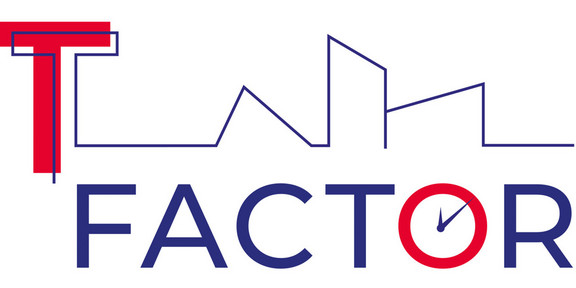2022
T-Factor project kicks off to unleash urban regeneration through heritage, culture, and creativity

“T-Factor: Unleashing future-facing urban hubs through culture and creativity-led strategies of transformative time” is a Horizon 2020 funded Innovation Action aimed at unlocking the transformative potential of ‘meanwhile spaces’ in urban regeneration. The project kicked off its first public meeting with global stakeholders this week.
Temporary and ‘meanwhile spaces’ are on the rise across Europe. More and more vacant buildings, plots and unutilized spaces are serving as temporary sites for co-creative experimentation, unlocking a multitude of innovative cultural, social and entrepreneurial activities. These initiatives typically contribute heavily to building a shared public value to rewire the social, cultural and economic fabrics of an area under regeneration. In many cases, they are well positioned to become permanent fixtures of the local landscape, acting as prototypes of future neighborhoods and areas. The project calls these temporary initiatives ‘meanwhile spaces’.
The project consortium has created a coalition with cities, universities, businesses and grassroots organizations with 25 organisations from 12 countries, committed to contributing knowledge to the inclusive and thriving futures of cities and developing tools & approaches towards temporary urbanism and ‘meanwhile use’.
A transformation agency and thematic transformation laboratories (T-Labs) form the core project structures. The transformation agency develops and manages the specific T-Factor city-making method. The focus is on linking cultural heritage and creativity as a basis for cooperation and participation in shaping future urban development. The seven thematic transformation labs support the pilots through knowledge inspiration and new tools. In this way, the pilots can experiment with the offerings from the T-Labs in their respective innovation orientations. To this end, various T-Labs work decentralised on selected topics. In the project, the Social Research Centre is focusing on the development of two transformation labs on the topics "Digitisation and Urban Production" and "Social Innovation and Inclusion".
The development of new approaches within the framework of T-Factor is complemented by case studies of already implemented projects of an international community. In addition to projects from Florence (Italy), London (UK), Barcelona (Spain), Marseille (France), New York (US), Shanghai (China) and Lodz (Poland), the Social Research Centre is investigating the urban renewal process "Dortmunder U and Union Quarter". The research unit Transformative Governance in Cities and Regions at sfs combines findings of the process of regeneration of a historic urban area using the example of the Dortmunder U with the urban redevelopment process "Rheinische Straße", up to the future developments of the Smart Rhino project. The dimensions of the study are in particular the planning, participation, financing and implementation of urban renewal projects - also with regard to meanwhile use concepts.
Years, and oftentimes decades, can go by between the approval process of a Masterplan to regenerate an urban area to its actual implementation. During these transitional times, a new generation of spaces to foster cultural, social, and entrepreneurial activities have become a determinant asset to adapt cities to the unknown.
T-Factor’s Local Pilots are the project’s proofs of concept, where the team will put the Advanced Research outcomes into practice in six early-development areas in the European Union. This emerging practice will have an increased use throughout the following years to tackle the uncertainty of urban regeneration. T-Factor’s Local Pilots include the following:
- Science Park in Amsterdam
- Zorrotzaurre in Bilbao
- Trafaria in Lisbon
- Aleksotas in Kaunas
- Mind in Milan
- Euston in London
The Social Research Centre's practice partner is the Social Innovation Center of the Economic Development Agency Dortmund, which contributes its expertise in the promotion of social innovation in municipalities to the project. The aim is to test and further develop these approaches in an international context, so that they can be used in Dortmund's urban development in a targeted manner in the future.
Project Statement:
Urban regeneration is challenged by the multiple crises we face. Climate change, rising inequality, democracy deficits, and labour disruptions are turning cities into engines of exclusion, eliminating the inclusive, participatory spaces that are so crucial for urban prosperity. Overly rigid top-down approaches to masterplanning have left yawning scars in our cityscapes: unfinished neighbourhoods, brand-new buildings standing empty, soulless districts that become monuments to the paradox of urban regeneration. Even when it appears successful on the surface, the process can hide the violent displacement of low and middle-income populations, a phenomenon that is most commonly known as ‘gentrification’. Cities need new models and tools that will allow them to keep pace with the complex, rapidly changing needs of our neighbourhoods. Urban regeneration is not only about the hardware of urban life but also the construction of new buildings and infrastructure. It is about rebuilding human connections and the social, economic and cultural aspects that makes cities thrive. The gaps left by infrastructure-only approaches to urban renewal have created some surprising opportunities. Vacant buildings, plots, and unused spaces have been filled by temporary, community-built cultural, social and entrepreneurial activities that have added collective animation to the city-making process. We want to turn ‘meanwhile spaces’ into a strategic field of action for deploying new ways to plan, design, fund, govern and regulate sustainable and thriving urban regeneration. T-factor ensures that cities, real estate developers, academics, and grassroots organisations are part of the same conversation.
More information about the T-factor Project is available on its website.




![[Translate to English:] [Translate to English:]](/storages/zentraler_bilderpool/_processed_/a/f/csm_Kontakt_b86e8d8ecc.png)
![[Translate to English:] [Translate to English:]](/storages/sfs-sowi/_processed_/7/e/csm_header_collage_sfs_eving_sozialforschungsstelle_dortmund_31bd3c09fb.jpg)